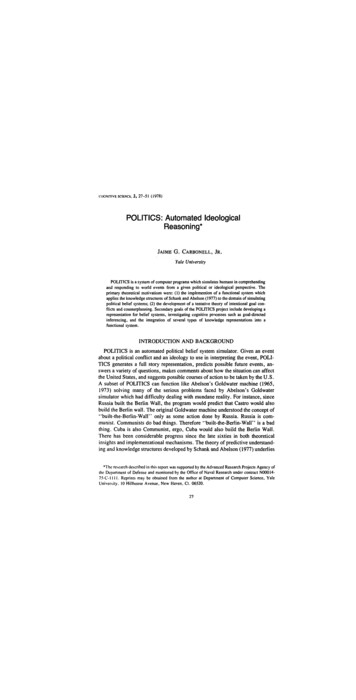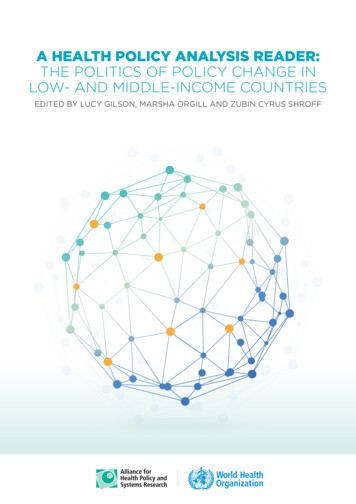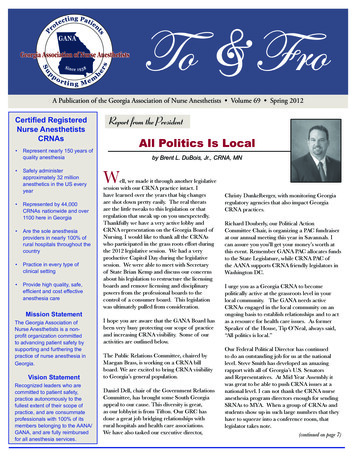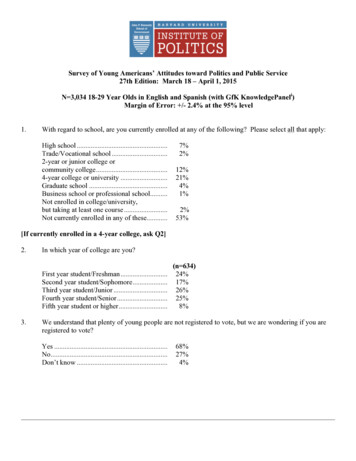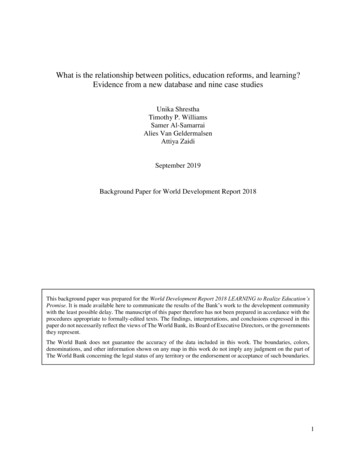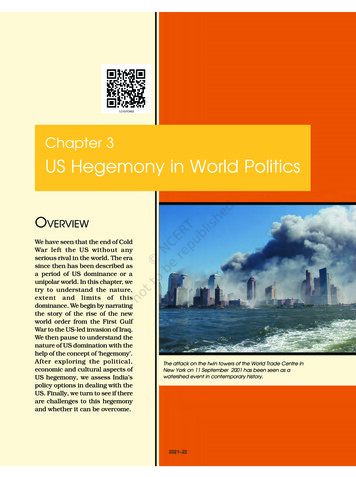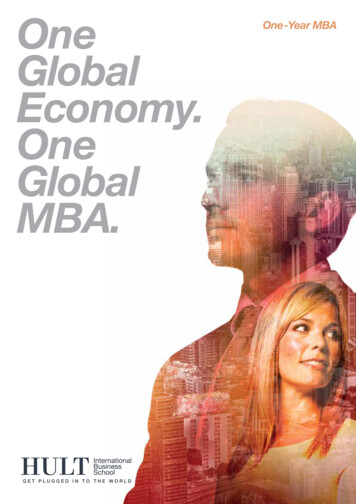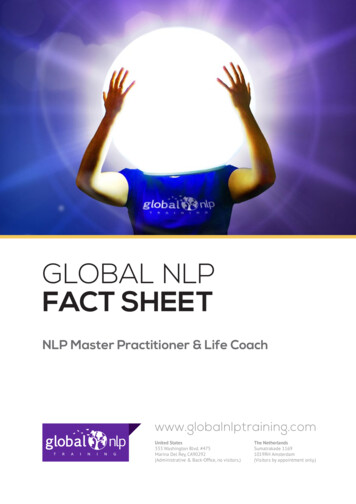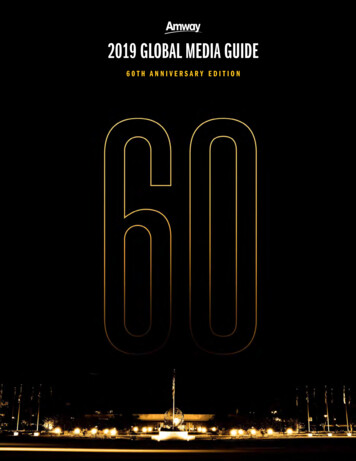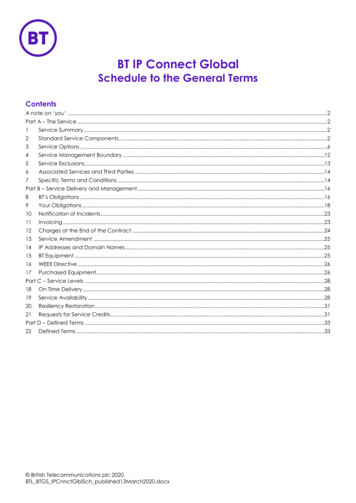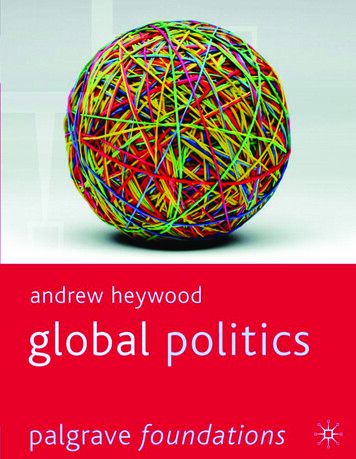
Transcription
Global Politics
Global PoliticsA N D R EW H EY WO O D
Andrew Heywood 2011All rights reserved. No reproduction, copy or transmission of thispublication may be made without written permission.No portion of this publication may be reproduced, copied or transmittedsave with written permission or in accordance with the provisions of theCopyright, Designs and Patents Act 1988, or under the terms of any licencepermitting limited copying issued by the Copyright Licensing Agency,Saffron House, 6–10 Kirby Street, London EC1N 8TS.Any person who does any unauthorized act in relation to this publicationmay be liable to criminal prosecution and civil claims for damages.The author has asserted his right to be identified as the author of this workin accordance with the Copyright, Designs and Patents Act 1988.First published 2011 byPALGRAVE MACMILLANPalgrave Macmillan in the UK is an imprint of Macmillan Publishers Limited,registered in England, company number 785998, of Houndmills, Basingstoke,Hampshire RG21 6XS.Palgrave Macmillan in the US is a division of St Martin’s Press LLC,175 Fifth Avenue, New York, NY 10010.Palgrave Macmillan is the global academic imprint of the above companiesand has companies and representatives throughout the world.Palgrave and Macmillan are registered trademarks in the United States,the United Kingdom, Europe and other countries.ISBN 978-1-4039-8982-6This book is printed on paper suitable for recycling and made from fullymanaged and sustained forest sources. Logging, pulping and manufacturingprocesses are expected to conform to the environmental regulations of thecountry of origin.A catalogue record for this book is available from the British Library.A catalog record for this book is available from the Library of Congress.10 9 8 7 6 5 4 3 2 120 19 18 17 16 15 14 13 12 11Printed in China
For Oliver, Freya, Dominic and Toby
This page intentionally left blank
Brief Contents1 Introducing Global Politics12 Historical Context253 Theories of Global Politics534 The Economy in a Global Age835 The State and Foreign Policy in a Global Age1116 Society in a Global Age1367 The Nation in a Global Age1578 Identity, Culture and Challenges to the West1819 Power and Twenty-first Century World Order20910 War and Peace23911 Nuclear Proliferation and Disarmament26312 Terrorism28213 Human Rights and Humanitarian Intervention30314 International Law33115 Poverty and Development35216 Global Environmental Issues38317 Gender in Global Politics41218 International Organization and the United Nations43219 Global Governance and the Bretton Woods System45620 Regionalism and Global Politics48021 Global Futures507vii
This page intentionally left blank
ContentsList of Illustrative MaterialPrefaceAcknowledgements1 Introducing Global PoliticsWHAT IS GLOBAL POLITICS?What’s in a name?From international politics to global politicsGlobalization and its implicationsLENSES ON GLOBAL POLITICSMainstream perspectivesCritical perspectivesCONTINUITY AND CHANGE INGLOBAL POLITICSPowerSecurityJusticeUSING THIS BOOK2 Historical ContextMAKING OF THE MODERN WORLDFrom ancient to modernRise of the WestAge of imperialismTHE ‘SHORT’ TWENTIETH CENTURY:1914–90Origins of World War IxivxixxxiiRoad to World War IIEnd of EmpiresRise and fall of the Cold WarTHE WORLD SINCE 1990A ‘new world order’?9/11 and the ‘war on terror’Shifting balances within the global economy122391212153 Theories of Global PoliticsMAINSTREAM PERSPECTIVESRealismLiberalismCRITICAL PERSPECTIVESMarxism, neo-Marxism and criticaltheorySocial constructivismPoststructuralismFeminismGreen politicsPostcolonialismTHINKING GLOBALLYChallenge of interconnectednessCosmopolitanismParadigms: enlightening or 4546167677173747576777779814 The Economy in a Global Age 83CAPITALISM AND NEOLIBERALISMCapitalisms of the world2929ix8484
xCONTENTSTriumph of neoliberalismImplications of neoliberalismECONOMIC GLOBALIZATIONCauses of economic globalizationHow globalized is economic life?GLOBAL CAPITALISM IN CRISISExplaining booms and slumpsLessons of the Great CrashModern crises and ‘contagions’90919393961001001031045 The State and Foreign Policyin a Global Age111STATES AND STATEHOOD IN FLUXStates and sovereigntyThe state and globalizationState transformationReturn of the stateNATIONAL GOVERNMENT TOMULTI-LEVEL GOVERNANCEFrom government to governanceMulti-level governanceFOREIGN POLICYEnd of foreign policy?How decisions are made6 Society in a Global AgeSOCIAL CONNECTEDNESS: THICKTO THIN?From industrialization to postindustrialismNew technology and ‘informationsociety’Risk, uncertainty and insecurityGLOBALIZATION, CONSUMERISMAND THE INDIVIDUALSocial and cultural implications ofglobalizationConsumerism goes globalRise of individualismGLOBAL CIVIL SOCIETYExplaining global civil 38141Transnational social movementsand NGOsGlobalization from below?7 The Nation in a Global AgeNATIONALISM AND WORLD POLITICSMaking sense of nationalismA world of nation-statesNationalism, war and conflictNATIONS IN A GLOBAL WORLDA world on the moveTransnational communities and diasporasHybridity and multiculturalismNATIONALISM REVIVEDNational self-assertion in the postCold War periodRise of cultural and ethnic nationalismAnti-globalization nationalism8 Identity, Culture andChallenges to the WestRISE OF IDENTITY POLITICSWesternization as modernizationPolitics of collective identityIs cultural conflict inevitable?RELIGIOUS REVIVALISMReligion and politicsThe fundamentalist upsurgeCHALLENGES TO THE WESTPostcolonialismAsian valuesIslam and the WestNature of political IslamThe West and the ‘Muslim 51451461471501509 Power and Twenty-firstCentury World Order209POWER AND GLOBAL POLITICSPower as capability210210
CONTENTSRelational power and structural powerChanging nature of powerPOST-COLD WAR GLOBAL ORDEREnd of Cold War bipolarityThe ‘new world order’ and its fateUS HEGEMONY AND GLOBALORDERRise to hegemonyThe ‘war on terror’ and beyondBenevolent or malign hegemony?A MULTIPOLAR GLOBAL ORDER?Rise of multipolarityMultipolar order or disorder?10 War and PeaceNATURE OF WARTypes of warWhy do wars occur?War as a continuation of politicsCHANGING FACE OF WARFrom ‘old’ wars to ‘new’ wars?‘Postmodern’ warfareJUSTIFYING WARRealpolitikJust war theoryPacifism11 Nuclear Proliferation andDisarmamentNUCLEAR PROLIFERATIONNature of nuclear weaponsProliferation during the Cold WarProliferation in the post-Cold War eraNUCLEAR ARMS CONTROL ANDDISARMAMENTArms control and anti-proliferationstrategiesA world free of nuclear 327812 TerrorismUNDERSTANDING TERRORISMDefining terrorismRise of ‘new’ terrorismSIGNIFICANCE OF TERRORISMTerrorism goes global?Catastrophic terrorism?COUNTERING TERRORISMStrengthening sate securityMilitary repressionPolitical deals13 Human Rights andHumanitarian InterventionHUMAN RIGHTSDefining human rightsProtecting human rightsChallenging human rightsHUMANITARIAN INTERVENTIONRise of humanitarian interventionConditions for humanitarian interventionDoes humanitarian intervention work?14 International 316318318324327331NATURE OF INTERNATIONAL LAWWhat is law?Sources of international lawWhy is international law obeyed?INTERNATIONAL LAW IN FLUXFrom international law to world law?Developments in the laws of warInternational tribunals and theInternational Criminal Court33233233433733933934415 Poverty and Development352UNDERSTANDING POVERTY ANDDEVELOPMENTDefining and measuring povertyDevelopment: competing visions353353355346
xiiCONTENTSA MORE UNEQUAL WORLD?Making sense of global inequalityContours of global inequalityGlobalization, poverty and inequalityDoes global inequality matter?DEVELOPMENT AND THE POLITICSOF AIDStructural adjustment programmesand beyondInternational aid and the developmentethicDebt relief and fair trade16 Global EnvironmentalIssuesTHE RISE OF GREEN POLITICSThe environment as a global issueGreen politics: reformism or radicalism?CLIMATE CHANGECauses of climate changeConsequences of climate changeHow should climate change be tackled?Why is international cooperation sodifficult to achieve?RESOURCE SECURITYResources, power and prosperity17 Gender in Global PoliticsFEMINISM, GENDER AND GLOBALPOLITICSVarieties of feminism‘Gender lenses’ on global politicsGENDERING GLOBAL POLITICSGendered states and gendered nationsGendering security, war and armedconflictGender, globalization and 39139239539940240640841241341341641841842242618 International Organizationand the United NationsINTERNATIONAL ORGANIZATIONRise of international organizationWhy are international organizations createdTHE UNITED NATIONSFrom the League to the UNPromoting peace and securityDoes UN peacekeeping work?Promoting economic and socialdevelopmentFuture of the UN: challenges and reform43243343343443543544044544644819 Global Governance and theBretton Woods System456GLOBAL GOVERNANCE?What global governance is, and is notGlobal governance: myth or reality?GLOBAL ECONOMIC GOVERNANCE:THE EVOLUTION OF THE BRETTONWOODS SYSTEMMaking of the Bretton Woods systemFate of the Bretton Woods systemEVALUATING GLOBAL ECONOMICGOVERNANCEThe International Monetary FundThe World BankThe World Trade OrganizationREFORMING THE BRETTON WOODSSYSTEMGlobal economic governance and the2007–09 crisisObstacles to reform45545545945946046446546545847047347347620 Regionalism and GlobalPolitics480REGIONS AND REGIONALISMNature of regionalismWhy regionalism?Regionalism and globalizationRegional integration outside Europe481481484489489
CONTENTSEUROPEAN INTEGRATIONWhat is the EU?The EU and the worldThe EU in crisis?21 Global FuturesIMAGES AND REALITYCONTENDING IMAGES OF THEGLOBAL FUTUREA borderless world?494495500501507508508509A world of democracies?Civilizations in conflict?A Chinese century?The growth of international community?The rise of the global South?The coming environmental catastrophe?Towards cosmopolitan democracy?AN UNKNOWABLE 21524541
List of Illustrative MaterialGlobal politics in actionSeptember 11 and global securityFall of the Berlin WallParis Peace Conference 1919–20Global financial crisis 2007–09The invasion of Iraq 2003The Rio ‘Earth Summit’, 1992The rise and fall of YugoslaviaIran’s ‘Islamic Revolution’The 2008 Russian war with GeorgiaThe war in Afghanistan as a ‘just war’The birth of the nuclear eraThe 2002 Bali bombingsHumanitarian intervention in East TimorThe Nuremberg TrialsThe ‘Year of Africa’The UN Climate Change Conference inCopenhagenGendered violence in anti-Muslim riots inGujaratThe UN and IraqThe collapse of Bretton WoodsThe EU expands to the eastGoogleRussiaAl JazeeraChinaNorth Atlantic Treaty Organization (NATO)Al-QaedaAmnesty International (AI)International Court of Justice (ICJ)World BankIntergovernmental Panel on Climate ChangeWomen’s movementUnited Nations (UN)International Monetary Fund (IMF)European Union (EU)World Trade Organization roaches toBalance of powerCold War, the end of theDevelopmentGender relationsGlobal economic governanceGlobal political economyGlobalizationHistoryHuman natureHuman rightsIdentityInternational lawInternational organizationNationalism403421443446504Global actorsNon-governmental organizations (NGO)United States of America (USA)The anti-capitalist movementTransnational corporationsGroup of Twenty 62
L I S T O F I L L U S T R AT I V E M AT E R I A LNatureSocietyThe stateTerrorismWar and peace393139115287244DebatingWas the Cold War inevitable?40Is democracy a guarantee of peace?66Do moral obligations extend to the wholeof humanity?80Does economic globalization promoteprosperity and opportunity for all?101Is state sovereignty now an outdatedconcept?124Is globalization producing a globalmonoculture?151Is nationalism inherently aggressive andoppressive?169Is there an emerging ‘clash of civilizations’? 190Does the USA remain a global hegemon?227Has military power become redundant inglobal politics?246Do nuclear weapons promote peace andstability?272Does the need to counter terrorism justifyrestricting human rights and basicfreedoms?299Is humanitarian intervention justified?328Is the International Criminal Court an effectivemeans of upholding order and justice?349Does international aid work?379Can only radical action tackle the problem ofclimate change?406Would a matriarchal society be morepeaceful?425Is the UN obsolete and unnecessary?451Does free trade ensure prosperity and peace? 474Does the advance of regionalism threatenglobal order and stability?490Focus onInternational Relations: the ‘great debates’The Westphalian state-system46Definitions of globalizationHitler’s war?Neorealist stability theory: the logic ofnumbers?Closing the realist–liberal divide?Structure or agency?All in the mind?A Chinese economic model?The Washington consensusA ‘knowledge economy’?Problems of state-buildingPerception or misperception?Consumerism as captivity?The two nationalisms: good and bad?International migration: are people pulled orpushed?Identity politics: who are we?Cultural rights or women’s rights?Islamism: religion as politics?Promoting democracy: for or against?Elements of national powerBeyond ‘power over’?The ‘war on terror’Pre-emptive attackHegemonic stability theoryOffensive or defensive realism?To balance or to bandwagon?The Iraq War as a ‘new’ war?Principles of a just warNorth Korea: a rogue nuclear state?Nuclear ethics: indefensible weapons?Suicide terrorism: religious martydom orpolitical strategy?Democracy as a human right?Human developmentThe North–South divideThe Zapatistas in Mexico: alternativedevelopment in action?World-systems theoryStructural adjustment programmesMillennium Development Goals: endingglobal poverty?The tragedy of the commons?Sustainable development: reconcilinggrowth with 361367371374388390
xviL I S T O F I L L U S T R AT I V E M AT E R I A LObligations to future generations?The Gaia hypothesis: a living planet?The greenhouse effectThe paradox of plenty: resources as a curse?Human security: individuals at risk?Relative or absolute gains?How the United Nations worksReforming the UN Security Council?A welfare dilemma?The G-7/8: an abandoned project?The BRICs: the ‘rise of the rest’?Regionalism in Asia: replicating Europeanexperience?How the European Union worksThe euro: a viable 5Deconstructing‘Cold war’‘Nation’‘Terrorism’‘War on terror’‘Human rights’‘Humanitarian imate change’‘United s raceBalance of powerBipolarityChaos theoryCollective itanismCultural globalizationCultureEcologyEconomic globalizationEthnicityFailed eralismFordism/post-FordismForeign policyGenderGenocideGeopoliticsGlobal civil societyGlobal governanceGlobalizationGovernanceGreat powerHegemonyHumanitarian interventionHuman nceIntergovernmentalismInternational aidInternational lawInternational organizationInternational regimeInternational societyInternationalismLaissez-faireLiberal ityNational interestNation-stateNation, ldingPeacekeepingPolitical 60230130164158226904174454441182194154210168338
L I S T O F I L L U S T R AT I V E M AT E R I A LRegionalismReligionReligious fundamentalismRogue stateSecurity dilemmaSovereigntyState, Third WorldTransnational communityUnipolarityWarWest, theWorld 26457Featured thinkersBenedict AndersonThomas AquinasZygmunt BaumanUlrich BeckBen BernankeJagdish BhagwatiMurray BookchinHedley BullE.H. CarrManuel CastellsNoam ChomskyKarl von ClausewitzRobert CoxHerman DalyKarl DeutschJean Bethke ElshtainCynthia EnloeMichel FoucaultMilton FriedmanFrancis FukuyamaMohandas Karamchand GandhiMarcus GarveyErnest GellnerSusan GeorgeAntonio GramsciHugo GrotiusErnst 8428179151326118516537571334487Garrett HardinThomas HobbesSamuel P. HuntingtonMary KaldorImmanuel KantRobert KeohaneJohn Maynard KeynesAyatollah KhomeiniDavid KilkullenNaomi KleinPaul KrugmanJames LovelockNiccolò MachiavelliThomas MalthusKarl MarxJohn MearsheimerCarolyn MerchantDavid MitranyJean MonnetHans MorgenthauArne NaessTerry NardinJoseph NyeSayyid QutbRoland RobertsonJeffrey SachsEdward SaidSaskia SassenJan Aart ScholteErnst Friedrich SchumacherAmartya SenVandana ShivaAdam SmithAnthony D. SmithGeorge SorosJoseph StiglitzSusan StrangeThucydidesJ. Ann TicknerMartin van CreveldImmanuel WallersteinKenneth WaltzMichael WalzerAlexander WendtMartin WightWoodrow 85165107468213242762501006025874517438
xviiiL I S T O F I L L U S T R AT I V E M AT E R I A LKey eventsWorld history, 1900–45The Cold War periodThe post-Cold War periodCrises of modern global capitalismAdvances in communication technologyThe Arab–Israeli conflictConflicts in the former YugoslaviaMajor nuclear arms control agreementsMajor international human rights documentsKey examples of humanitarian interventionMajor development initiativesMajor international initiatives on theenvironmentHistory of the United NationsGATT/WTO negotiating roundsHistory of the European uresDimensions of global politics3The billiard ball model of world politics7Cobweb model of world politics8Growth of the world’s population since 1750 28Growth of membership of the United Nations,1945–present37Multi-level governanceHard, soft and smart powerThe accumulation of nuclear warheads by theUSA and the Soviet Union, 1945–1990Number of warheads held by nuclear powers,2010 (estimate)Maslow’s hierarchy of needsA pond as an ecosystemThe greenhouse effect126214267270354385398TablesThree generations of human rightsTop ten and bottom ten countries in termsof HDI rankingsTop ten and bottom ten countries in the GDIand GEM league tablesCompeting models of global politicsKey regional organizations and groupingsof the world308365430460485MapsColonial holdings, circa 1914YugoslaviaGlobal migratory flows since 1973Europe and EU membership30167172497
PrefaceThe aim of this book is to provide an up-to-date, integrated and forwardlooking introduction to international relations/global politics. It seeks to begenuinely global while not ignoring the international dimension of world affairs,accepting that ‘the global’ and ‘the international’ complement one another andare not rival or incompatible modes of understanding. In this view, global politics encompasses not just politics at the ‘global’ level – that is, worldwideprocesses, systems and institutional frameworks – but politics at, and, crucially,across all levels – the worldwide, the regional, the national and the subnational.Such an approach reflects the fact that while, over an increasing range of issues,states interact with one another in conditions of global interdependence, theynevertheless remain the key actors on the world stage.The interconnectedness that such a global approach to politics implies nevertheless brought challenges in terms of how the topics and issues considered inthis book should be organized and presented. It may be a platitude to suggestthat everything in world affairs now influences everything else, but it is difficultto deny that it contains a germ of truth. One of the implications of this is that itserves to thwart any attempt to divide the book into meaningful parts, as suchsub-divisions would impose a compartmentalization of knowledge that wouldeither be difficult to justify, or would constrain, rather than sharpen, understanding. That said, the organization of chapters is certainly not random, butconforms to a logic that flows from a series of developing themes. These areoutlined in the final section of Chapter 1. A particular emphasis has been placedon ensuring that topics and issues are fully and appropriately integrated, so thatreaders can grasp the links between the events, concepts and perspectives underdiscussion. This is done, in part, by extensive cross-referencing, which bothavoids needless repetition and shows readers how and where they can extend ordeepen their understanding. Theory and practice are also integrated in that,although there is a separate chapter that introduces the major theories of globalpolitics, key theoretical approaches to major issues are flagged up in eachchapter, with a stress on combining the major traditions of international relations theory with a more multidisciplinary approach. Finally, the book containsa wide variety of pedagogical features, the nature and purpose of which are highlighted in the following double-page spread.xix
xxPREFACEGUIDE TO THE KEY FEATURESThe pedagogical features found in this book allow important events, conceptsand theoretical issues to be examined in greater depth or detail, whilst also maintaining the flow of the main body of the text. They are, moreover, designed toencourage readers to think critically and independently about the key issues ofglobal politics.Each chapter starts with a Preview that outlines the major themes and aseries of questions that highlight the central themes and issues addressed in thechapter. At the end of each chapter there is a Summary of its major points, a listof Questions for discussion, and suggestions for Further reading. Additionalmaterial is provided throughout the text in the form of glossary panels andboxed information. These boxes are comprehensively cross-referenced throughout the text. The most significant features are the following:A P P ROAC H E S TO . . .GLOBALIZATIONRealist viewRealists have typically adopted a sceptical stancetowards globalization, seeing it more in terms of intensifying economic interdependence (that is, ‘more of thesame’) rather than the creation of an interlockingglobal economy. Most importantly, the state continuesto be the dominant unit in world politics. Instead ofbeing threatened by globalization, the state’s capacityfor regulation and surveillance may have increasedrather than decreased. However, realists are not simplyglobalization deniers. In assessing the nature andsignificance of globalization, they emphasize that globalization and the international system are not separate,still less rival, structures. Rather, the former should beseen as a manifestation of the latter. Globalization hasbeen made by states, for states, particularly dominantstates. Developments such as an open trading system,global financial markets and the advent of transnational production were all put in place to advance theinterests of western states in general and the USA inparticular. Furthermore, realists question the notionthat globalization is associated with a shift towardspeace and cooperation. Instead, heightened economicinterdependence is as likely to breed ‘mutual vulnerability’, leading to conflict rather than cooperation.Liberal viewLiberals adopt a consistently positive attitude towardsglobalization. For economic liberals, globalizationreflects the victory of the market over ‘irrational’national allegiances and ‘arbitrary’ state borders. Themiracle of the market is that it draws resources towardstheir most profitable use, thus bringing prosperity toindividuals, families, companies and societies. Theattraction of economic globalization is therefore that itallows markets to operate on a global scale, replacingthe ‘shallow’ integration of free trade and intensifiedinterdependence with the ‘deep’ integration of a singleglobal economy. The increased productivity and intensified competition that this produces benefits all thesocieties that participate within it, demonstrating thateconomic globalization is a positive-sum game, a gameof winners and winners. Liberals also believe that globalization brings social and political benefits. The freerflow of information and ideas around the world bothwidens opportunities for personal self-development andcreates more dynamic and vigorous societies. Moreover,from a liberal standpoint, the spread of market capital-ism is invariably associated with the advance of liberaldemocracy, economic freedom breeding a demand forpolitical freedom. For liberals, globalization marks awatershed in world history, in that it ends the periodduring which the nation-state was the dominant globalactor, world order being determined by an (inherentlyunstable) balance of power. The global era, by contrast,is characterized by a tendency towards peace and international cooperation as well as by the dispersal ofglobal power, in particular through the emergence ofglobal civil society (see p. 152) and the growing importance of international organizations.Critical viewsCritical theorists have adopted a negative or oppositional stance towards globalization. Often drawing onan established socialist or specifically Marxist critiqueof capitalism, this portrays the essence of globalizationas the establishment of a global capitalist order.(Indeed, Marx (see p. 69) can be said to have prefigured much ‘hyperglobalist’ literature, in having highlighted the intrinsically transnational character of thecapitalist mode of production.) Like liberals, criticaltheorists usually accept that globalization marks ahistorically significant shift, not least in the relationship between states and markets. States have lost powerover the economy, being reduced to little more thaninstruments for the restructuring of nationaleconomies in the interests of global capitalism.Globalization is thus viewed as an uneven, hierarchicalprocess, characterized both by the growing polarizationbetween the rich and the poor, explained by worldsystems theorists in terms of a structural imbalancebetween ‘core’ and ‘peripheral’ areas in the globaleconomy, and by a weakening of democratic accountability and popular responsiveness due to burgeoningcorporate power. Feminist analysts have sometimeslinked globalization to growing gender inequalities,associated, for example, with the disruption of smallscale farming in the developing world, largely carriedout by women, and growing pressure on them tosupport their families by seeking work abroad, leadingto the ‘feminization of migration’. Postcolonial theorists, for their part, have taken particular exception tocultural globalization, interpreted as a form of westernimperialism which subverts indigenous cultures andways of life and leads to the spread of soullessconsumerism.Approaches boxesoutline importanttheoretical approachesto a central theme underdiscussion, providing ineach case realist, liberaland critical views of thetheme or issue.Global politics in actionboxes examine majorevents in global politicsand reflect on how theycontribute to ourunderstanding of worldaffairs.GLOBAL POLITICS IN ACTION . . .Global financial crisis 2007–09Events: The global financial crisis started to show itseffects in the middle of 2007 with the onset of theso-called ‘credit crunch’, particularly in the USA andthe UK. However, this merely provided a backgroundto the remarkable events of September 2008, whenglobal capitalism appeared to teeter on the brink ofthe abyss, threatening to tip over into systemicfailure. The decisive events took place in the USA.Fannie Mae and Freddie Mac, two government-sponsored mortgage corporations, were bailed out byFederal authorities; Lehman Brothers, the 158-yearold investment bank, succumbed to bankruptcy; theinsurance giant AIG was only saved by a 85 billiongovernment rescue package; while Wachovia, thefourth largest US bank, was bought by Citigroup,absorbing 42 billion of bad debt. Banking criseserupted elsewhere, and stock markets went intofreefall worldwide, massively reducing share values andbetokening the onset of a global recession. Some of thepanic went out of the banking crisis of September 2008when the US government promised to take all the dangerous debt out of the US banking system, making this thebiggest bailout in the history of modern finance.Significance: Debate about the significance of the globalfinancial crisis of 2007–09 is closely linked to disagreement about its underlying causes. Was the crisis rooted inthe US banking system, in Anglo-American enterprisecapitalism, or in the nature of the capitalist system itself?At one level, the crisis was linked to inappropriate lendingstrategies adopted by US banks and mortgage institutions,the so-called ‘sub-prime’ mortgage market. These high-riskloans to applicants with poor or non-existent credit histories were unlikely to be repaid, and when the scale of‘toxic debt’ became apparent shockwaves ran through theUS financial system and beyond. At a deeper level,however, the ‘sub-prime’ problem in the USA was merely asymptom of the defects and vulnerabilities of the neoliberal capitalism that has taken root in the USA and the UKin particular, based on free markets and an under-regulated financial system. At a deeper level still, the crisis hasbeen interpreted as exposing serious imperfections not ina particular form
MAKING OF THE MODERN WORLD 26 From ancient to modern 26 Rise of the West 27 Age of imperialism 28 THE ‘SHORT’TWENTIETH CENTURY: 1914–90 29 Origins of World War I 29 Road to World War II 32 End of Empires 36 Rise and fall of the Cold War 38 THE WORLD SINCE 1990 44 A ‘new

